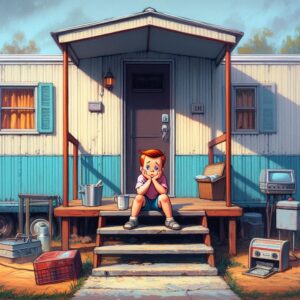
Most of my blog posts are fun, whimsical, or educational. This one is not.
This is the story of a five-year-old boy who lived with the feeling that his mother was mad at him. It is a story of sadness, grief, and longing. It is my story.
I want to preface this by saying that I do not expect sympathy or compassion. This story is sixty years old, and I have long since learned to live with it. I don’t expect any allowances or benefits from my experience. I’m sharing it only to show what can be done with a little luck and determination.

April 1965 found me living in a mobile home in Dearborn Heights, Michigan. Easter had just passed, and I had a new toy that I loved playing with alongside my mother—a small tabletop pool table. The cue sticks were spring-loaded, and we’d take turns hitting the tiny balls into the pockets. Looking back, I’m sure my mother got bored with it pretty quickly, but she never let it show. She doted on me, sharing all of her favorite things. I remember her small record collection and how much she loved Petula Clark. I can still picture some of her albums, and years later, I even collected a couple for myself.
In my five-year-old mind, my mother “hung the moon.”
Just over a week after Easter, I was playing inside. I must have been bugging her because she told me to go outside and wait for my stepfather to get home from work. She said she was going to take a bath and then make dinner. I did as I was told, sitting on the steps and waiting.
I don’t know how long I sat there—probably not long, given my age—but eventually, I went back inside to ask my mother a question. She was in the bathtub and just stared at me without responding. I asked again. She kept staring, silent. I took it as a rebuke for bothering her and went back outside to wait.
Some time later, my stepfather came home, and everything became a blur. A flurry of activity. I was shuffled off to a neighbor’s trailer, where I sat on the floor next to a side table. I don’t remember much else.
Much later, I was told my mother had passed away. I tried to process it the best a five-year-old could.
She had been in the tub when a plugged-in radio accidentally fell into the water.
My next memory is of sitting in short pants on a cold granite bench outside a big building with columns. I assume it was the funeral home, but I’m not sure. I can still feel the cold and smooth on the back of my legs. Days passed in a haze, and I remember my aunts and uncles crowded into a trailer, their anger directed at my stepfather.
On the day of the funeral, my grandfather took me for a walk around the trailer park. It was the only time I ever saw him cry. To this day, I think losing my mother affected him far more deeply than he let on. He tried to explain what was happening. I’m sure I listened, but I didn’t understand. All I knew was that I wanted my mother.
And then there’s the part that haunts me, even now.
Why was my mother mad at me? When I went in to ask my question, she just stared ahead, silent. That image has stayed with me, as vivid today as it was then. As an adult, I now understand that she was already gone by the time I spoke to her. But even now, I can’t quite shake the feeling I had as that five-year-old boy.
The months that followed were a blur of moving between my stepfather’s family and my mother’s family until I finally landed in the place where I would grow up. But even after all these years, I still wish for one more moment with her. One more laugh as a tiny pool ball flew off the table and clattered around the kitchen.
Instead, I’m left with the irrational belief that she died angry at me.
Again, I don’t want or expect sympathy, nor do I want anyone to treat me differently because of this story. I share it because, as teachers, we sometimes forget what our students bring with them into our classrooms. Their reactions may seem irrational, but there may be a reason. A deep, unseen wound.
I ask teachers—and anyone who works with kids—to have grace.
I was lucky. I have been lucky ever since. I lived by the idea that others had it worse and so I shouldn’t complain. These experiences shaped me, but they don’t define me. I am defined by my family and the life I have built. It may not seem fair that a five-year-old had to endure such a loss. But I remind my students: life isn’t fair.
What it is, however, is balanced.
Too many people get stuck on the bad and forget to acknowledge the good. So as you walk through your day, take a moment to look for the good things.
